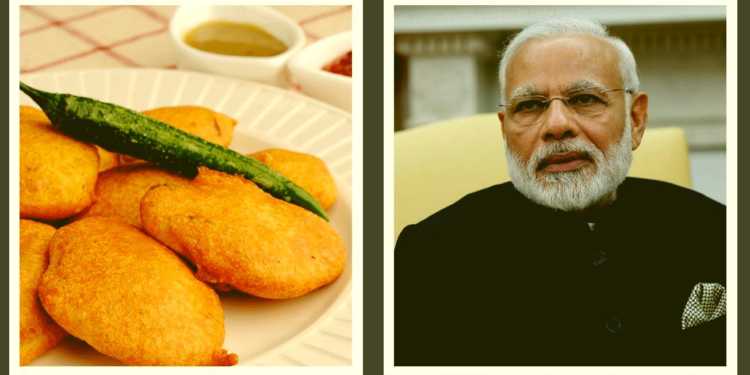When PM Modi made a statement about a street vendor taking home 200 rupees by selling Pakodas, at the end of the day being employed, the opposition burst into flames like a Phoenix from Harry Potter. Curses followed, as they do, and idiotic trends about Pakodas and #INeedAJob were curated. Now, it’s correct for people to expect employment but what qualifies as employment in our traditional stereotypical parameters?
What is employment really? Is it just about sitting in some cubicle before a computer or between a stack of files that make no sense? Is it employment only when a monthly six-digit salary is involved, or when one drives a glorious sedan to work? Are only those deserving of respect who work in buildings that are made of glass on the outside or shop in malls every weekend via flashy credit cards?
I hail from a UT/State Capital, a relatively small city compared to the likes of Bangalore and Delhi, and here, we have vendors making decent money by selling fast-food, some even beating the mainstream hubs when it comes to sales. I regularly visit an old man who sells Indian Chaat, Tikki and yes Pakodas too, has a son working as a driver, a daughter-in-law working as a domestic help. I have met a security guard who helped his son through engineering by working 12-hours a day, and yet, none of them had a six-digit salary, or the luxury of SEZ infrastructure, or even a 4-wheeler, forget a sedan. Aren’t they employed?
Our biggest problem in tackling employment has been the lack of respect we have had for the informal sector, and that is one reason we have a lack of labour laws. Our handicraft industries have suffered, our Micro, Small, and Medium Enterprises were not being helped with any loans for a long while because they were seen as irrelevant, and their ability to grow and prosper was discarded. Employment was narrowed down to being a Doctor, Engineer, IAS, Bank Officer, and anything apart from these conventional professional choices was the failure of the job seeker.
With MUDRA scheme, Modi government issued loans to people from rural areas, people who did not have the education of the cities or the skills that accompanied an IIM graduate, but the spirit to be self-dependent. Reports cited that 50,000-rupees was too less an amount for any business to flourish, but what were they expecting? Was PM Modi supposed to hand-out an interest free loan in excess of say 500,000-rupees to everyone under the scheme with lack of credit history and risk a huge fiscal deficit or worse, initiate a smaller version of a 2008 like financial chaos? MUDRA scheme helped many people take small steps towards ease of living, self-reliance, and with integration of JAM, these efforts are collaborating to fit into the larger picture of National Development.
As an urban poor, look back and recall how often you wanted to work part-time in a ‘PVR’ or a ‘Burger King’ just to make those expenses meet, just to pull-off that loan you took for engineering, just to send home some more money, and could not, because of societal and peer pressure, of the lack of respect these choices held in the eyes of the society.
Cracking jokes about Pakodas and mocking the spirit of vendors is another low by the Congress party and its supporters, for many of those vendors make far more than engineering graduates do, and this is not the failure of the latter, but the skill of the former, the skill that needs to be integrated within the formal sector.
200 rupees a day may not get one a sedan, or a weekly ticket to PVR, but it does enable many in India to send their kids to school, to hope for a future for their kids they could not have, and to live without the mercy of Government support.
Congress wanted the rural population to be a slave to their periodic gifts or schemes, but this is a new India that wishes to be self-reliant, and this is where one must admire the Modi government. PM Modi is not handing out free fishes, but teaching each one how to fish.
Is taking home 200 rupees a day by selling Pakodas worse than being on the payroll of MNREGA or begging on signals or being on the threshold of poverty line for one’s whole life?
I don’t think so.
If we cannot treat what the vendors on street or the ushers in McDonald’s earn when compared to those working in IT or Medicine with compassion, an open mind, and financial intelligence, we cannot truly respect the spirit of India. It’s not about 200 rupees a day or 2000 rupees a day, it’s about self-dependency. We admire famous celebrities when they recall how they came to Bombay with nothing but a few rupees in their pockets, but mock the spirit of a Pakoda vendor only because they make 200 rupees a day working as a street vendor, or the leader who wishes to help them?
Hardik Patel is right when he says that a ‘chaiwaala’ can only recommend people ‘selling pakodas’ for a living. He is right because the ‘chaiwaala’ knows the value of hard work, the opportunities determination can produce, and the spirit it takes to make a journey from being a tea-seller to the Prime Minister of the biggest democracy on Earth. Now, he wants the financially weak to believe in that spirit instead of being dependent on the government for basic amenities.
I’ll go and have some hot pakodas with tea while you ponder over this.
























